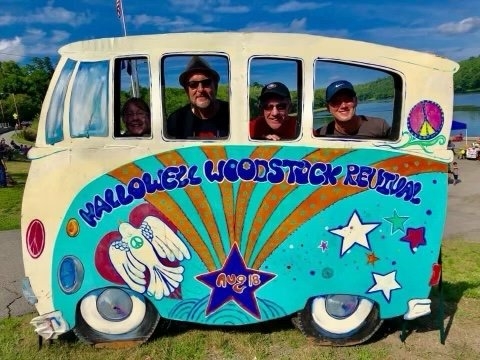When a teenage Karl Bartos told his parents he wanted to devote his life to music, his father was so furious that he tore his son’s acoustic guitar to pieces.
After hearing The Beatles at the age of 12, something had awakened in him – “I wanted to hear how they sounded,” he says – and so he persisted past that smashed guitar. Tripping on LSD listening to Hendrix was another portal. “The music spoke to me in all the languages of the world at once,” he recalls in his memoir. “I understood his message down to the last frequency. Never before had the essence of music been so clear.”
The memoir, The Sound of the Machine: My Life in Kraftwerk and Beyond, is an incredibly detailed book about Bartos’ life: from those crucial childhood moments, years spent at the Robert Schumann Conservatory in Dusseldorf where he studied percussion, until his time what is considered the classic line of Kraftwerk – Bartos, Ralf Hütter, Florian Schneider, Wolfgang Flür – in which he played from 1974 to 1990.
Kraftwerk were looking for a percussionist for some live dates and Bartos was recommended by his professor. Being summoned to his infamous and secretive Kling Klang Studio, he immediately clicked with Hütter and Schneider. “We were attracted to each other and it just felt pure,” he recalls. “I knew from the first meeting that it was something very special.”
The union of Bartos coincided with the release of Autobahn, a disc – especially its title track – often considered a reference point for modernity in pop music, with its pulsating groove that extends into the future. Work soon began on the concept album Radio-Activity, and Bartos became more of an integrated member, contributor and co-writer. Subsequent albums Trans-Europe Express, The Man-Machine and Computer World (1977-1981) are an immaculate and peerless run of records that shimmer and shine with metallic sparkle; equal parts meticulous pop and futuristic sci-fi soundscapes, they became the blueprint for electronic pop in the following decade. Bartos says that Kraftwerk’s mission was to invest technology with humanity, to make it “felt and visible – and this was different from all the electronic pop music that was inspired by us. We only treated electronic equipment as” and a guitar; they just played songs in the tradition of English pop music. But Kraftwerk remained different because we wanted to make people aware of the technique.”
Not only did the band scale consistent creative peaks in the studio, but their dynamic was more friendly and sociable. Some lived together in a place that housed what Bartos describes as “legendary parties,” although he won’t be drawn on the juicy details. For those we should instead return to the memory of Flür I Was A Robot. “A Super 8 projector will play sex movies on the wall next to the bathtub,” he wrote. “Everything will be covered with foam bath and red wine, and the light of the candles will only illuminate the sweaty scene. These parties were like Sodom and Gomorrah.” It seems in contrast to such a mysterious and secretive band that was experimenting with the use of robot aliases – and Bartos’s book plays on writing by focusing intensely on working methods, the creative process and technology.
In 1981, they went on a successful tour – despite their equipment weighing seven tonnes – and had a UK No 1 the following year with The Model. They were at their creative and commercial peak, with Bartos writing that Computer World “was our most successful attempt to translate the dialectic of the man-machine metaphor into music”, but Kraftwerk did not appear in directed for almost a decade as they disappeared in the world. the studio “We slept through the ’80s,” Bartos says. “It was really a dramatically huge mistake.”
The next album, 1986’s Electric Café, was a drastic change. “The problem started when the computer came into the studio,” says Bartos. “A computer has nothing to do with creativity, it is just a tool, but we have outsourced creativity to the computer. We have forgotten the center of what we were. We have lost our physical feeling, we no longer look in the eye, just looking at the monitor. At that time, I thought that innovation and progress were synonymous. I can no longer be so sure.”
It turns out that this member of a group that heralded a new era of futuristic, heavy-tech music is something of a techno-skeptic, but Bartos insists that the era that most people associate as Kraftwerk peaked. produced by a largely analog band. They were pushing the limits of primitive technology to their absolute limit, and for Bartos, these limitations sparked innovation. But when presented with endless options, there was nothing to scratch, only an unlimited horizon. “We’ve stopped being creative because we’re solving problems,” he says.
The pace of work has slowed significantly. Hütter’s new obsession with cycling became a priority and the studio sessions were often a few hours in the middle of the evening. In addition, they had become obsessed with each other’s records, often taking trips to nightclubs to play the first mixes of their tracks to see how they sounded against the fresh cuts of the day. They started chasing the zeitgeist instead of setting it. After hearing New Order’s Blue Monday, they were so impressed that they sought out their sound engineer, Michael Johnson, and flew to the UK to mix Tour de France – a standalone single from 1983 – but chose never to release that version.
“Things started to look more and more bleak,” says Bartos. “Instead of remembering how our most authentic and successful music was made, we fixed our gaze on the zeitgeist of mass market music. But comparing our ideas to the work of others was anti-creative and counterproductive. We became musical designers, producing consumer music aimed only at winning against other competitors. Our imagination lost its autonomy. It seemed that we forgot how our music was born in the first place.”
Flür lost patience and went to pursue furniture manufacturing and Bartos also prepared an exit, with financial problems around credits and song payments, as well as a refusal to tour, which was also a problem “It was a complete nightmare,” he says of that time. Although typical of the detached approach of Hütter and Schneider at this point, there was little in the way of response or drama when he finally left in 1990.
He began a period in which he felt “very low”, but soon began to work with Andy McCluskey of Orchestral Maneuvers in the Dark, writing songs together, as well as collaborating with the parallel project of Bernard Sumner and Johnny Marr Electronic in his second album. “They saved my life,” he reflected. “Because I knew I wasn’t alone.”
McCluskey recalls that Bartos expressed an interest in working together as “one of the 12 disciples who invite you to join their band.” Bartos also had a hand in McCluskey creating the girl band Atomic Kitten. “He was retired, but he was presumptuous enough to think he could still write songs,” recalls McCluskey. “Karl said, ‘don’t just give it to the publisher because you’ll screw it up and be a songwriting whore.’ He said, ‘Why don’t you create a vehicle for your songs?’ to people: “Yes, Kraftwerk created Atomic Kitten”. before releasing two solo albums in 2003 and 2013. Kraftwerk, meanwhile, had a stellar return to recording with Tour De France Soundtracks in 2003, and – now with Hütter the only original member – they have long toured a 3D live show.
Reflecting on Kraftwerk today, it’s not so bitter, more disappointed than it could have been, lamenting the lost time, creative energy and dark form of a decade where they could electrify audiences with prescient but defining music. it was That said, he didn’t have much time for how Kraftwerk continued to evolve. “Society has turned into a carrier,” he says. “You can resources, turn it into a consumer product, make money and … trash. This is what happened to Kraftwerk. They turned into the dehumanization of music.”
Although he still very much loved his time in the classic analog era of the band. “I liked being a man-machine,” he says. “But we just lost the man.”



